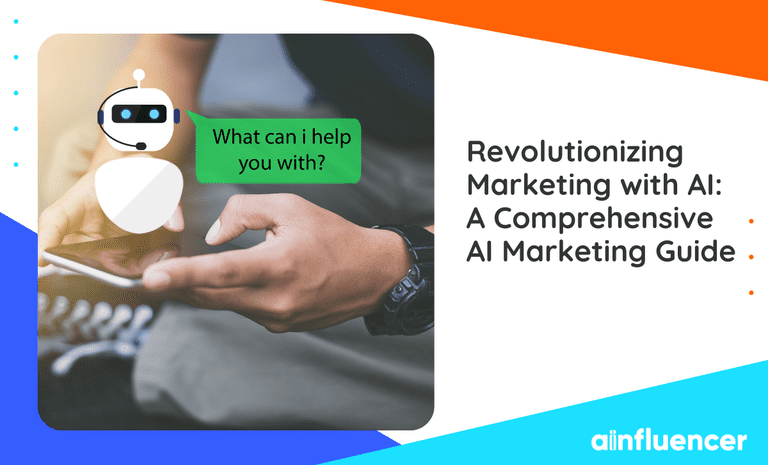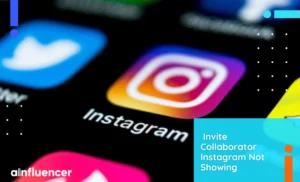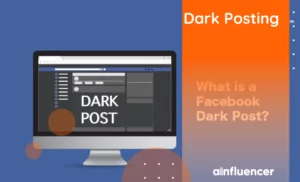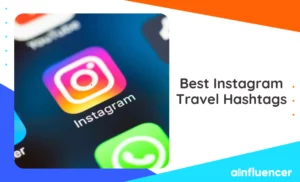Welcome to the exciting world of AI marketing! With the rise of artificial intelligence, businesses are now able to leverage cutting-edge technologies to enhance their marketing efforts and connect with customers in more meaningful ways than ever before.
From predictive analytics to chatbots, AI is transforming the marketing landscape, enabling companies to create personalized experiences, improve customer engagement, and drive growth like never before.
Regardless of your level of experience in marketing, the realm of AI marketing has something to offer you. So, fasten your seatbelt and get ready to explore the exciting world of AI Marketing – where innovation meets creativity to deliver results like never before!
But before we dive into AI marketing, let’s introduce another popular form of marketing known as influencer marketing. You probably know what influencer marketing is. It’s a collaboration between a brand and a social media influencer to promote its products or services. However, finding the influencers in your niche that promote you to the exact target audience might seem challenging.
However, Ainfluencer handled it perfectly. It’s a free influencer marketplace with over 500 thousand verified influences that enables you to search for influencers in your niche and location. And It’s FREE. So, sign up and see for yourself.
What is AI Marketing
Artificial Intelligence marketing AKA AI marketing is the use of advanced technologies, such as machine learning, natural language processing, and computer vision, to automate and optimize marketing processes.
It involves using data-driven insights and predictive analytics to develop more personalized, targeted, and effective marketing campaigns that are designed to enhance customer experiences and drive sales.
AI can be used in various marketing tasks such as analyzing customer behavior, understanding customer preferences, automating repetitive marketing tasks, personalizing content, and improving customer interaction.
In addition, AI marketing can help businesses to increase efficiency and reduce costs by automating manual tasks and improving the accuracy of marketing efforts. It can also help businesses to improve customer satisfaction by delivering personalized experiences and targeted messages that are more relevant to each individual customer.
Different Types of AI Marketing
By using AI in marketing, companies can build stronger relationships with customers, drive business growth, and stay ahead of the competition. Here are some exciting and innovative types of AI marketing that are being used today:
1. AI in Content Marketing
As a content writer, learning that ChatGPT generates content that can be even better than handwritten blogs frightened me at the beginning. But then I learned to use it as a helping hand and now we are good friends.
AI has the potential to revolutionize content marketing by helping companies create engaging content at a faster pace to attract more audiences. One of the significant benefits of AI in content marketing is the ability to generate various types of content, such as blog posts, social media updates, and product descriptions.
Besides, by analyzing data about customer preferences and interests, AI can create content that is tailored to each individual customer. This can help companies save time and resources while still delivering high-quality content to their audiences.
2. Predictive Analytics
This type of AI marketing uses machine learning algorithms to analyze customer data and make predictions about their future behavior. By understanding customer preferences and behavior, companies can create more effective marketing campaigns that are tailored to their audience.
3. Image Recognition and Image Generation
AI-powered image recognition technology can be used to analyze and tag images, making it easier for companies to organize and search their digital assets. Additionally, this technology can be used to deliver more targeted ads and product recommendations to customers based on the visual content they engage with.
4. Natural Language Processing (NLP)
NLP is a type of AI technology that enables machines to understand and interpret human language. In marketing, NLP can be used to analyze customer feedback and sentiment, identify keywords and topics of interest, and generate automated responses for customer service inquiries.
5. Augmented Reality (AR)
AR technology is being used by companies to enhance the customer experience by overlaying digital elements onto the physical world. For example, AR can be used to show customers what a product would look like in their home before they make a purchase or to provide a virtual tour of a hotel or vacation rental.
6. Voice-Enabled Search
With the increasing popularity of voice assistants like Siri and Alexa, more companies are incorporating voice-enabled search into their marketing strategies. By optimizing content for voice search and using AI to understand natural language queries, companies can make it easier for customers to find the information they need and interact with their brand.
Benefits of Using AI in Marketing
Incorporating AI into your marketing efforts is no longer an option but a necessity. By doing so, you can streamline your processes, improve your marketing strategies, and gain a competitive edge over your rivals. Here are some specific benefits of integrating AI marketing into your digital marketing efforts:
1- Time and Budget Efficiency
Generative AI in marketing provides time and budget efficiency through automation. But how?
AI can rapidly gather user data and generate insights that would take people significantly longer. This frees up your team to concentrate on important tasks, such as campaign strategy development, including optimizing the use of AI in upcoming campaigns.
With conversational AI tools like ChatGPT, marketers can generate extensive replies and concise summaries, while automated content generation and marketing automation reduce the need for manual work, saving time and budget for content creation.
Generative AI also minimizes human errors and streamlines processes, further helping marketers save time and reduce costs for control tasks.
2- Targeted and Personalized Content
Generative AI tools are capable of producing custom-tailored content for your target audience by utilizing a blend of data analysis, NPL, and machine learning algorithms.
These tools analyze consumer behavior, track their interactions with a brand or platform, and detect patterns in their behavior to create a unique content strategy. With this strategy, customers are reached through personalized emails and targeted social media posts that align with their preferences and interests.
3- Increased Innovation and Inspiration
Especially for marketing campaigns, AI can increase innovation and inspiration by quickly processing vast amounts of data and identifying patterns and trends that humans may not be able to recognize. By providing insights and suggestions, AI can help people generate new ideas and approaches to problem-solving.
Plus, AI-powered tools can also assist with tasks such as brainstorming, prototyping, and testing, which can accelerate the innovation process. Additionally, AI can help bridge language and cultural barriers, enabling greater collaboration and the exchange of diverse perspectives and ideas.
What Are the Problems With AI in Marketing
While AI can bring significant benefits to marketing, there are also some potential problems that need to be addressed in AI marketing:
Lack of Human Touch
Earlier we mentioned AI marketing can increase personalization. But, it’s far from human-written content. Using a person’s name in the text of an email is a common email marketing strategy. And AI tools can do that. But can they add personalization in the text as humans can do? Maybe in the near future, they can. But, not today.
In other words, AI can automate processes and reduce the need for human intervention, but it can also lead to a lack of personalization and a decrease in the human touch that is important for building relationships with customers.
Biased Data
AI relies on data to learn and make decisions, but if the data is biased, it can lead to biased results. This can be particularly problematic in areas such as targeted advertising, where biased data can result in discriminatory practices.
Overreliance on Technology
Relying too heavily on AI can lead to a lack of creativity and innovation, as marketers may become too dependent on data-driven insights and overlook other valuable sources of inspiration.
Lack of Transparency
Another important point in using AI for marketing is transparency. AI algorithms can be complex and difficult to understand, which can lead to a lack of transparency and accountability. As a result, the use of AI in decision-making can become problematic if stakeholders are unaware of how the AI is making its decisions.
Data Privacy and Security
AI relies on vast amounts of data, which can be a potential target for cyber attacks. Additionally, there are concerns around data privacy and how personal data is collected, stored, and used by AI algorithms.
It’s important for marketers to be aware of these potential problems and take steps to address them, such as ensuring data is unbiased, being transparent about how AI is used, and maintaining strong data privacy and security measures. By doing so, they can harness the benefits of AI while avoiding its potential pitfalls.
How Can I Adopt AI in My Marketing Strategy
If you are considering using AI for your marketing plans, nothing should stop you. Although AI can’t make magic and fix everything by itself, it can facilitate the marketing process a lot.
To effectively use AI for marketing, it is essential to follow specific steps that can help you achieve your marketing goals. In this regard, we are going to explain a few key steps that you should consider when using AI for marketing.
- Define your marketing goals: Identify the marketing objectives you want to achieve through AI adoption, such as increasing customer engagement, improving conversion rates, or enhancing brand awareness.
- Evaluate AI tools: Research and compare different AI tools and technologies that align with your marketing goals. Consider factors such as cost, ease of use, and integration capabilities.
- Gather and analyze data: Collect data from various sources, including customer interactions, social media, and website analytics, and use AI tools to analyze and extract insights that can inform your marketing strategy.
- Monitor and adjust: Regularly monitor your AI-driven marketing efforts and adjust your strategy as needed to ensure you are achieving your marketing goals.
By following these steps, you can successfully adopt AI in your marketing strategy and leverage its capabilities to enhance customer experiences, increase efficiency, and drive business growth.
Conclusion
AI is revolutionizing the marketing industry by providing new and innovative ways to improve customer experiences and increase revenue. With AI-powered tools and algorithms, businesses can analyze large amounts of data and automate tasks, allowing for more personalized and effective campaigns.
Chatbots are a prime example of AI being used to optimize customer interactions, while influencer marketing can benefit from AI matching algorithms that identify the right influencers for a brand.
Chatbots are a cost-effective and efficient way to engage customers in real-time, improve their experience, and collect valuable data. Using AI, chatbots can personalize interactions and guide customers through the sales funnel, increasing engagement and loyalty. They’re an excellent tool for businesses looking to optimize their marketing strategies and provide 24/7 customer support.
AI marketing involves using artificial intelligence to improve marketing strategies and create more personalized and effective campaigns. It can automate tasks such as data analysis, lead generation, and customer segmentation, providing more targeted messaging for higher conversion rates.
AI can help influencers in several ways, including analyzing data to identify trends, creating high-quality content, matching influencers with brands, and tracking engagement metrics. AI-powered tools can assist influencers in improving their performance, reaching more audiences, and creating more effective content.
With the help of AI, influencers can gain valuable insights into their audience demographics and preferences, allowing them to create more personalized and targeted content that resonates with their followers.
Python is the most commonly used programming language for AI due to its active community, numerous libraries and frameworks specifically for AI and machine learning. Python’s readability and ease of use make it an attractive option for beginners in AI and programming. Other languages like Java and C++ can also be used, but Python remains the most popular and widely used in the field.
Related Articles:









